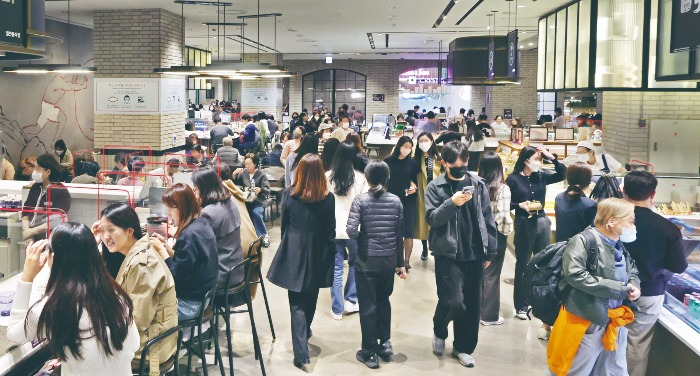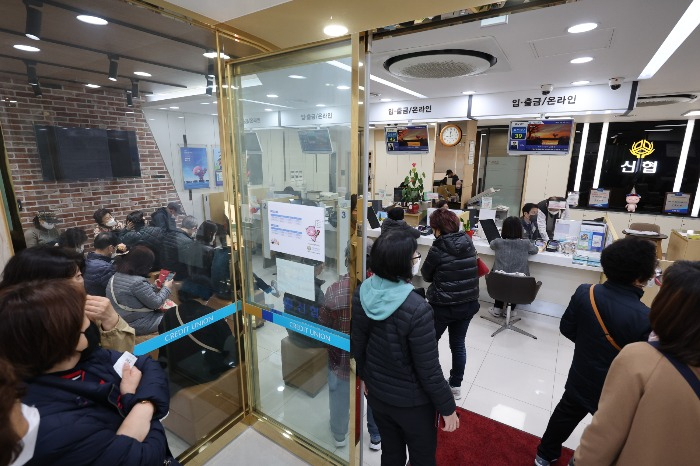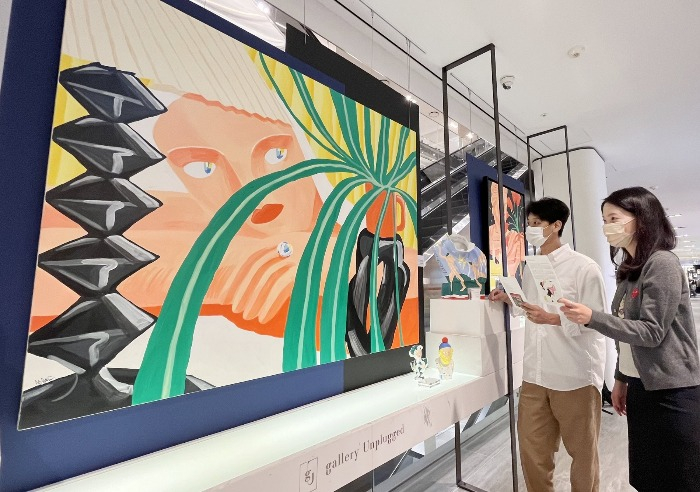Robust consumer spending in South Korea despite economic downturn
Experts expect the trifecta of rising interest rates, cooling market sentiment and inflation to dampen consumer sentiment
By Oct 22, 2022 (Gmt+09:00)
LG Chem to sell water filter business to Glenwood PE for $692 million


Kyobo Life poised to buy Japan’s SBI Group-owned savings bank


KT&G eyes overseas M&A after rejecting activist fund's offer


StockX in merger talks with Naver’s online reseller Kream


Mirae Asset to be named Korea Post’s core real estate fund operator



A buyer who works for the men's fashion division of a South Korean department store had trouble sleeping ahead of the fall sale that ran from Sept. 30 to Oct. 16. With the rise in the price of raw materials, the price of new clothes for the fall and winter has risen 15% on average.
The buyer was expecting customers to be cinching their belts amid rising interest rates and the cooling market. But the result of the sale came as a huge surprise to him, with a whopping 40% year-on-year increase in revenue for fall men’s fashion.
HOTELS AND RESTAURANTS
Restaurants in Seoul's major commercial districts are packed day and night.
More than ten groups of people were seen waiting for a table at a Korean-Chinese restaurant earlier this week, even though it was charging 24,000 won ($16) for a bowl of black noodles, which usually costs around 6,000 won.
The lobby of the posh L’Escape Hotel in Myungdong was also packed with people checking in.
An employee of the Josun Hotel and Resort, which operates L’Escape and other luxury hotels around Korea, said that the booking rate exceeds 80% just with Seoulites taking staycations and with those from outside Seoul wanting to spend a day or two in the capital city.
The same trend was detected in a big data analysis conducted by The Korea Economic Daily and BC Card. In the eight largest commercial districts in Seoul, including Gangnam, Myungdong and Itaewon, BC Card transactions in the last week of September were 8% higher than the figure seen in the last week of April when social distancing measures were lifted.
REASONS BEHIND ROBUST SPENDING
The robust spending is at odds with rising interest rates, the cooling market, and inflation as it goes against the conventional wisdom of those three factors leading to dampened consumer sentiment.
Experts say improved consumer sentiment driven by the endemic is still carrying the spending spree.
The Bank of Korea delivered its fourth interest rate hike in a row for the first time in its history in late August as monetary authorities expected inflation in Asia’s fourth-largest economy to accelerate to the highest point since the 1997-98 Asian financial crisis. The central bank raised its benchmark policy rate by 25 basis points (bps) as expected to 2.50% in a unanimous decision.

Some say the structural changes seen in South Korea over the last two years have supported strong spending.
“There is more money transferred to employees’ bank accounts monthly to make up for the inflationary pressure,” Kim Jung-sik, Professor Emeritus at the School of Economics at Yonsei University said.
Many IT companies around the country have rapidly increased the salaries for developers in recent months and have maintained these levels.
The average annual salary at the 10 biggest companies by market capitalization reached 52.98 million won in the first half of this year, up 10.9% from the same period last year. The number of employees jumped by 12,213 people to reach 301,881 employees.
As the resale market for luxury goods has become more vibrant than ever, millennials and Gen Zers are recognizing the products as assets. A CEO in the retail industry said, “Because the high-end fashion items, especially shoes and bags, can be sold at any moment in the secondhand market, young people these days easily make those purchases.”

South Koreans also tend to have more real estate in their asset portfolios than those in other developed economies.
Ahn Dong-hyun, a professor at the Department of Economics at Seoul National University said, “Unlike stocks and funds, the plunge in the value of real estate is not easily felt by the owners.”
MATTER OF TIME
Experts do not expect the current strong spending to continue well into the future.
A report by the Bank of Korea published this week forecasts that the global economic downturn and the rise in interest rates will eventually lead to sluggish consumer sentiment. “Every time the base interest rate increases by 1% point, the rate of decline in private consumption growth could hover around 0.02% and 0.13% points,” the report indicated.
The word on the street is that the economic slowdown is already on its way.
In big box stores, monthly revenue has increased by only around 2-3% since April, lower than August's 4.4% inflation. Judging by the discrepancy, some experts say the slowdown in consumption has officially begun.
Write to Jong-Kwan Park at pjk@hankyung.com
Jee Abbey Lee edited this article.




